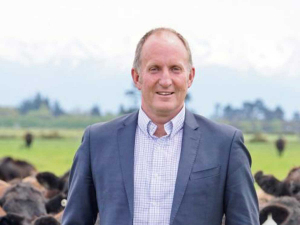TB slaughter levy for dairy jumps 75c/head
TB differential slaughter levy rates are changing with dairy animals paying $12.25/head, an increase of 75c from next month.
 Beef+Lamb chair Andrew Morrison says his organisation is committed to arguing for a fair and appropriate framework for tackling climate change.
Beef+Lamb chair Andrew Morrison says his organisation is committed to arguing for a fair and appropriate framework for tackling climate change.
Beef+Lamb NZ is committed to arguing for a fair and appropriate framework for tackling climate change, claims chairman Andrew Morrison.
"The latest International Panel on Climate Change (IPCC) report adds weight to our argument that the current targets of a 10% reduction by 2050 in New Zealand's Zero Carbon bill are too high," Morrison says.
"The IPCC report makes it clear that the current accounting metric for climate emissions, known as GWP100, overstates the effect of constant methane emissions on global surface temperature by a factor of 3-4 over a 20-year horizon. GWP100 also understates the effect of new (or increasing) methane emissions by a factor of 4-5 over a 20-year horizon."
He says the IPCC report makes it clear that New Zealand's current methane targets do not "let farmers off the hook".
"It states that a 0.3% reduction per year in methane is equivalent to net zero for carbon dioxide - that is, there would be no additional warming from methane at this level of reduction."
Morrison points out that the IPCC states that if methane is stable or reducing, (as it has been in New Zealand since 2001), then using GWP100 to report methane's contribution at a national level each year to climate change is inaccurate.
"It notes that an alternative accounting method, known as GWP* scales emissions over time and better accounts for the different warming behaviours of short-lived gases," he adds.
"We've been advocating for GWP* for some time, with other primary sector organisations here and overseas, and with the Government."
Morrisson says following the IPCC report, B+LNZ wil be renewing its efforts to have the Government use GWP* and report on both emissions and warming each year, so that the true contribution of each sector's emissions to warming can be seen and understood.
"We will also be redoubling our efforts for a review of the methane reduction targets in New Zealand's Zero Carbon Bill using GWP* in collaboration with other argricultural organisations."
Morrison adds that B+LNZ will work with counterpart international organisations to promote the global adoption of GWP* as the appropriate metrict for measuring the climate impact of agricultural GHGs.
Thanks, But No Thanks!
Meanwhile, in a joint letter - along with Feds Andrew Hoggard and DairyNZ's Jim van der Poel - Andrew Morrison has rejected consultant Steve Cranston's proposed 'vision' towards climate neutrality, suggesting that GWP* cannot be used to credibly achieve this.
In the letter, the three leaders say they believe that all farming groups have a different role to play in farmer advocacy. "While Groundswell has been successful in applying pressure as a grass roots movement, they play a very different role to traditional agricultural bodies like DairyNZ, Beef + Lamb NZ, and Federated Farmers. We each need to play to our strengths if we are to achieve better outcomes for farmers."
Morrison and co go on to say that while they agree that it would be great if agriculture could be branded as NZ's first major climate neutral industry, it needs to be underpinned by something.
"You can't credibly achieve this simply by saying that we reject GWP100 and are now using GWP*," they explain.
"We are all suportive of exploring GWP* as an alternative metric to GWP100 and will continue to advocate for a better understanding of the differences between short-lived and long-lived gases, and their warming impacts, to inform policy settings both internationally and here in NZ."
Agrisea NZ has appointed Craig Hudson as it's new chief growth officer.
State farmer Landcorp, trading as Pamu, is a forecasting a full-year net profit of around $100 million.
Tony Aitken, chief executive of Ruralco, has been awarded the Excellence in Business Leadership Award at the ANZ Business of the Year Awards.
Global trade has been thrown into another bout of uncertainty following the overnight ruling by US Supreme Court, striking down President Donald Trump's decision to impose additional tariffs on trading partners.
Controls on the movement of fruit and vegetables in the Auckland suburb of Mt Roskill have been lifted.
Fonterra farmer shareholders and unit holders are in line for another payment in April.

OPINION: Here w go: the election date is set for November 7 and the politicians are out of the gate…
OPINION: ECan data was released a few days ago showing Canterbury farmers have made “giant strides on environmental performance”.